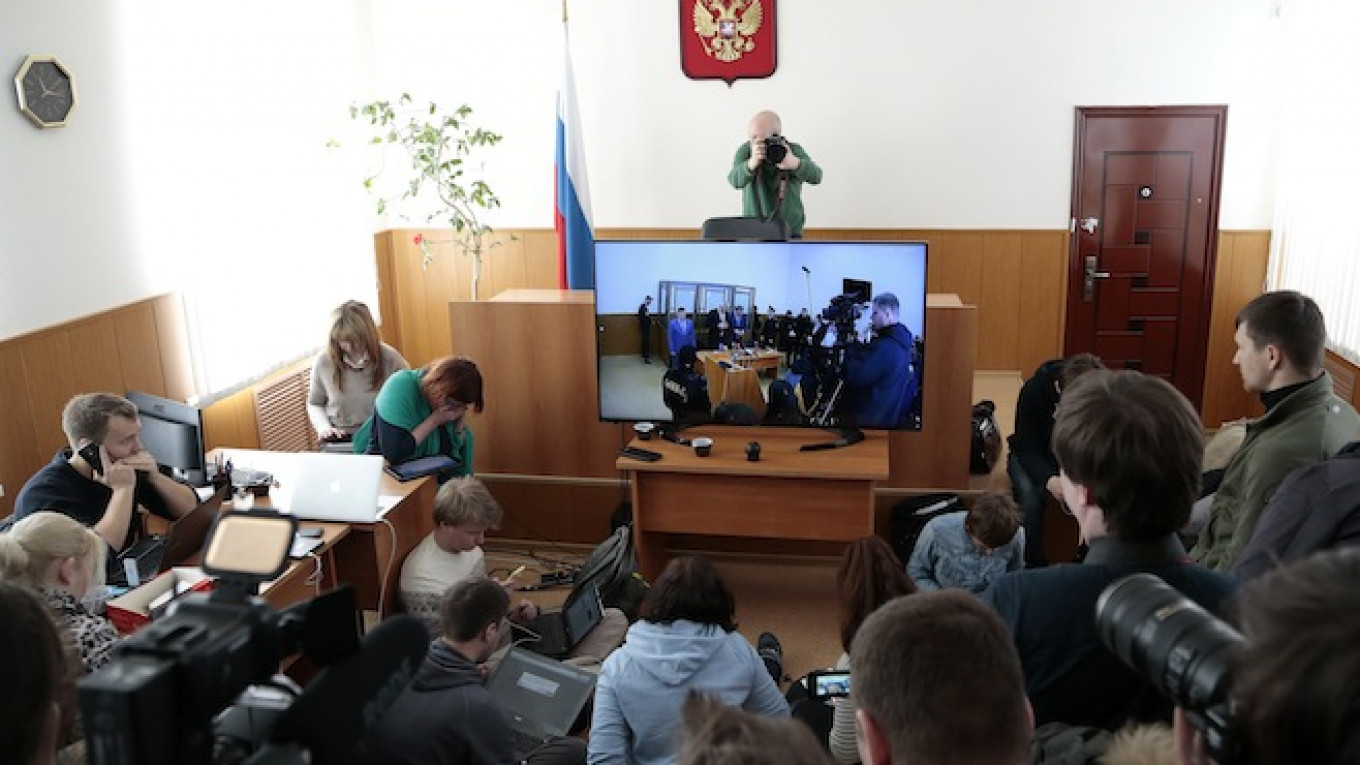The Donetsk municipal court in southern Russia has begun the sentencing of Ukrainian military pilot Nadezhda Savchenko, who has been on trial on charges of abetting the killing of two Russian journalists. The Moscow Times reviews the highlights of one of the most notorious cases of the last two years.
2014
• On June 17, Russian journalists Igor Kornelyuk and Anton Voloshin of the VGTRK state-run media holding are killed in Luhansk, Ukraine.
• On June 23, a 33-year-old Ukrainian pilot Nadezhda Savchenko is detained on Russian soil after “illegally crossing” into Russia, according to Russian investigators.
• On July 9, Investigative Committee spokesman Vladimir Markin announces that Savchenko was charged with “abetting in killing” the journalists.
• Ukrainian officials maintain that Savchenko was captured by separatists in Luhansk, spirited across the border against her will and then handed over to Russian intelligence officers. In July, the Ukrainian Foreign Ministry issues a statement that says: "Ukraine's Foreign Ministry expresses its categorical protest against the illegal trafficking of Nadezhda Savchenko to Russia."
• The U.S. Embassy in Moscow calls for Savchenko's immediate release, condemning “kidnapping by separatists, her illegal transfer to Russian authorities and her prolonged detention.”
• In September, Savchenko is transferred to Moscow for a forensic psychiatric assessment.
• In October, Savchenko is elected to the Ukrainian parliament in absentia. She heads the ballot of Yuliya Timoshenko's Batkivshina party.
• In November, Savchenko is declared sane and transferred back to pre-trial detention.
• On Dec. 15, Savchenko declares a hunger strike, after being refused medical treatment in the pre-trial detention center.
2015
• In January, another criminal case is launched against Savchenko,, based on the accusations of her illegally crossing the Russian border.
• At the same time, Savchenko wins a seat in the Ukrainian delegation of the Parliamentary Assembly of the Council of Europe (PACE).
• In February — in an interview to the OpenRussia website — Savchenko says she is ready to “go until the end.” She also announces she would consider force-feeding torture, and that she is ready to die as a result of her hunger strike.
• In February, Russian opposition-leaning Novaya Gazeta newspaper collects 11,500 signatures under a petition to Russian President Vladimir Putin, urging him to release Savchenko from prison, with dozens of prominent human rights advocates, journalists and artists among signatories. It is followed by the Presidential Human Rights Council calling on the Investigative Committee and the Prosecutor General's Office to release Savchenko — to no result.
• Meanwhile, the U.S. State Department spokeswoman Jennifer Psaki and the UN high commissioner on human rights Rupert Colville call on Russian authorities to release Savchenko — also to no avail.
• Savchenko continues her hunger strike until March, when her health declines significantly and a group of Ukrainian doctors recommend her adopt a special rehabilitation diet.
• In May, PACE claims Savchenko's membership in the organization provides her with immunity from prosecution. The court in Moscow refutes the claim, citing her initial detention occurring before she became a PACE delegate. The Moscow court also dismisses the defense's complaint regarding investigators' refusal to allow Savchenko to attend PACE sessions.
• In September, the trial of Savchenko's case begins in Donetsk — a small southern Russian town that shares its name with the main rebel stronghold eastern Ukraine. Savchenko denies the charges, telling the court "I am a soldier, not a murderer." Her defense team argues that she was innocent, presenting evidence that she was captured before the attack on the journalists occurred; therefore, she could not have conducted it.
• Russian Justice Ministry announces the possibility of Savchenko's extradition after the sentencing in October. Later in the year, other Russian officials talk about the possibility of a prisoner exchange, but no decisions are made.
• In December, Investigative Committee spokesman Vladimir Markin says Savchenko might receive a “tough” sentence.
2016?
• The trial concludes in March. The prosecution ask the court to convict Savchenko for 23 years in prison. Savchenko's defense insists on her innocence in their closing arguments.
• On March 3, Savchenko declares a dry hunger strike after the court postpones her final statement to March 9. The text of her statement is posted online by her sister Vera and goes viral.
• After her final statement is read on March 9, Ukrainian President Petro Poroshenko says he would be prepared to use his constitutional rights to approve Savchenko’s inclusion in a prisoner exchange. He adds that there has been no such proposal from the Russian side.
• On March 10, entering the sixth day of the hunger strike, Savchenko agrees to start drinking water and taking vitamin supplements after receiving a letter from Poroshenko. The letter turns out to be a fake sent by pro-Kremlin Russian pranksters Vovan and Lexus.
• On March 21, the court begins reading the verdict. According to news reports, it will take two days to deliver it in full. In December last year Savchenko said she would not appeal the sentence, no matter how harsh.
• Chair of the Presidential Human Rights Council Mikhail Fedotov said on March 21 that prisoner exchange will only be possible after the sentence comes into force. He added that if the prosecution appeals the sentence, exchange could be delayed pending the appeal.
Contact the author at d.litvinova@imedia.ru. Follow the author on Twitter at @dashalitvinovv


